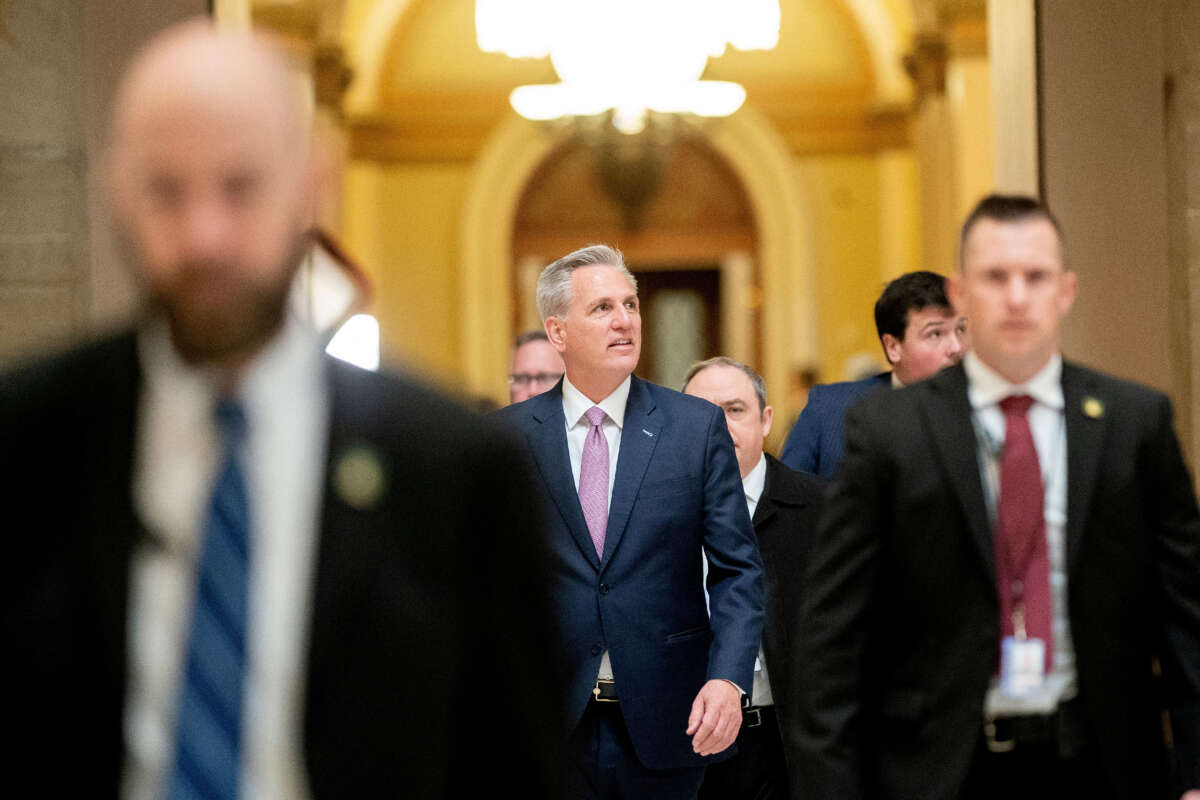Honest, paywall-free news is rare. Please support our boldly independent journalism with a donation of any size.
House Republicans’ plan to majorly slash federal spending over the next decade as a supposed “solution” to the national debt would likely cost millions of jobs and trigger a recession next year, a new report by Moody’s Analytics economists finds.
With Republicans in charge of only one chamber of Congress, the party has turned to the debt limit as a vehicle for their policy priorities, using the debt limit and the health of the U.S. economy as a bargaining chip. And, as part of a concession to the furthest right Republicans in the House — and as part of the party’s plans as a whole — House Majority Leader Kevin McCarthy (R-California) has pledged to propose a budget that would put the U.S. “on a path to a balanced budget” within the decade.
If Republicans follow through with this plan, the report finds, it would almost certainly cause a recession in 2024, costing the U.S. 2.6 million jobs and pushing unemployment to nearly 6 percent. It would also cause the country’s GDP to lower by 2.7 percent within the next 10 years.
The details of these cuts aren’t clear, but Moody’s assumed that the cuts — amounting to $16 trillion — would be to Medicaid and other non-defense discretionary programs.
With the U.S. slated to hit the debt limit this summer, Republicans have presented budget cuts as their alternative to blocking legislation to raise the debt ceiling, which would have even more disastrous results. If Republicans hold the debt limit hostage for not being able to force through their extreme spending cuts, the impact could be “cataclysmic” to the economy, Moody’s wrote.
If the debt limit were breached and the federal government was forced to default on its loans, the U.S.’s creditworthiness would be shattered and “economic carnage” would ensue. The ensuing 2008-style recession would cause the elimination of 7 million jobs and push the unemployment rate above 8 percent. Household wealth would plummet by $10 trillion.
“If lawmakers are unable to increase or suspend the debt limit before the Treasury fails to make a payment later this summer, the resulting chaos in global financial markets will be overwhelming. The U.S. and global economies, which are already struggling with high inflation and rising interest rates, would suffer a severe economic downturn,” the report says. “In times past, lawmakers have taken strident warnings like these to heart and acted. Let us hope they do so again. Soon.”
The report was prepared ahead of a hearing on Tuesday in front of the Senate Banking, Housing and Urban Affairs Committee’s Subcommittee on Economic Policy, led by Sen. Elizabeth Warren (D-Massachusetts). Citing the findings, Warren wrote a letter to President Joe Biden, saying that the White House must reject both the Republican spending cuts and a debt default.
The president must “stand firm against Republicans’ economy- and job-destroying debt ceiling demands,” Warren said. “Congress can and should extend the debt ceiling immediately, cleanly, with no ifs, buts, or ands — just as Republicans did three times for President [Donald] Trump. Instead, House Republicans are playing politics with millions of jobs, demanding massive cuts in critical government programs.”
During testimony in front of the committee on Tuesday, Mark Zandi, Moody’s chief economist and coauthor of the report, said that the abolition of the debt limit is the ideal path forward. Warren has also advocated for the debt limit to be eliminated, saying in an interview last year that it “serves no function except to create leverage for people who are willing to blow up the economy.” After blowing up the economy, Warren said, Republicans would likely pin the blame on Biden as a strategy for the 2024 presidential election.
Press freedom is under attack
As Trump cracks down on political speech, independent media is increasingly necessary.
Truthout produces reporting you won’t see in the mainstream: journalism from the frontlines of global conflict, interviews with grassroots movement leaders, high-quality legal analysis and more.
Our work is possible thanks to reader support. Help Truthout catalyze change and social justice — make a tax-deductible monthly or one-time donation today.
